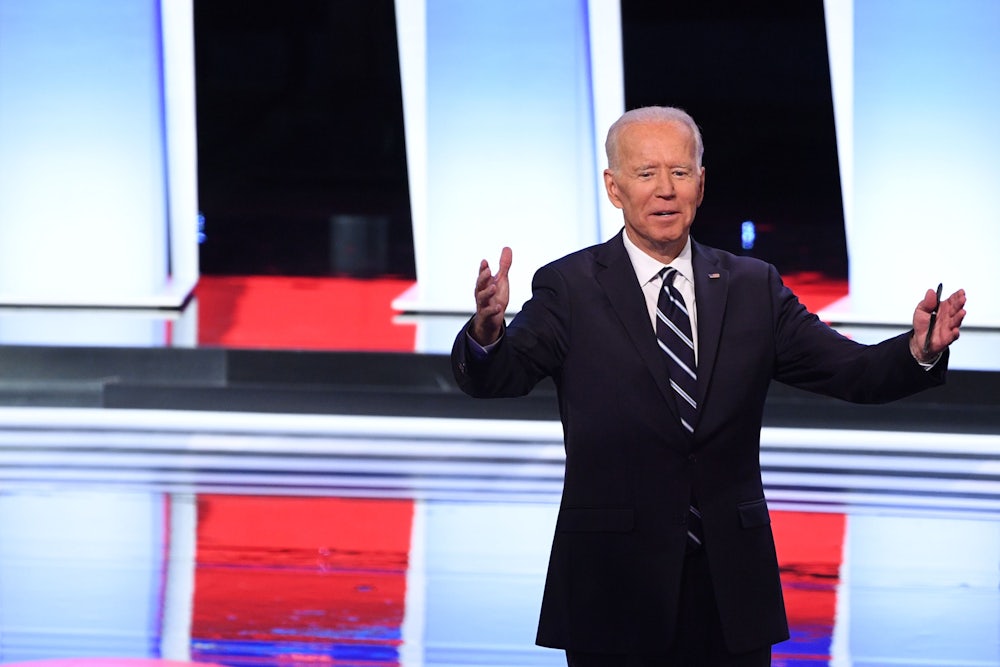The first words spoken by a candidate on Wednesday’s debate stage came from Joe Biden. “Go easy on me, kid,” he joked to Kamala Harris as she walked out on stage for the candidate introductions. The senator did not go easy on him, nor did most of the other Democratic contenders in Detroit. But nobody managed to land a blow that would change the trajectory of the race or dent Biden’s front-runner status.
The second round of debates this week may have been the last real opportunity for some of the candidates to do just that. The Democratic National Committee’s qualification rules are likely to exclude at least half of the current contenders from the third debate in September. It was not quite a make-or-break night for Biden himself, who already qualified for the next round. But it was close. His languid performance in last month’s debates not only boosted Harris into the upper tier of candidates, but also raised questions about whether he could pull off a grueling presidential bid.
Biden avoided a moment like the one Harris elicited last month, and largely parried whatever attacks the other candidates threw his way. When it came to substance, however, Biden was more muddled. When their party is out of power, presidential candidates typically portray themselves as agents of bold change. Biden hasn’t done that. Instead, he’s promising to restore America to its pre-Trump state and finish the work of the Democratic president under whom he served. He’s running a status quo candidacy for a status quo that no longer exists.
The debate’s early jousts revolved around health care. True to form, Biden resisted Medicare for All and other wholesale reforms in favor of the Obama administration’s incrementalist approach. “Obamacare is working,” he said. “The way to build this and get to it immediately is to build on Obamacare. Go back and do—take back all the things that Trump took away, provide a public option, meaning every single person in America would be able to buy into that option if they didn’t like their employer plan, or if they’re on Medicaid, they’d automatically be in the plan.” In other words, he merely wants to make Obamacare what it could have been in 2010, before centrist Democrats nixed a public option when drafting the law. Any greater aspirations for health-care reform are deemed unrealistic.
When the debate turned to immigration, Biden rejected Julián Castro’s call—embraced many other candidates—to decriminalize border crossings. He refrained from articulating a holistic view for immigration reform beyond the usual nation-of-immigrants bromides of American politicking. Instead, he laid many of the processes’ woes at the current president’s feet. “People should have to get in line,” he argued. “That’s the problem. And the only reason this particular part of the law is being abused is because of Donald Trump. We should defeat Donald Trump and end this practice.”
It’s indisputable that Trump has contributed to the abusive practices on the border and that he bears ultimate responsibility for the suffering and trauma inflicted there. At the same time, Biden’s answers elided how Obama laid the groundwork for some of Trump’s most aggressive policies. “In the first two years of the Obama administration, nearly 800,000 immigrants were deported, far more than during President Trump’s first two years,” Don Lemon asked Biden. “Would the higher deportation rates resume if you were president?”
The former vice president instead blamed circumstances beyond his former boss’ control. “Absolutely not, number one,” Biden replied. “Number two, everything landed on the president’s desk but locusts.” Then he took a shot at Castro, who served as secretary of the Housing and Urban Development Department under Obama. “I found that Julian—excuse me, the secretary—we sat together in many meetings. I never heard him talk about any of this when he was the secretary.” When New York Mayor Bill de Blasio later tried to egg Biden into defending Obama’s deportation record, Biden instead touted Obama’s role in creating the Deferred Action for Childhood Arrivals program to defer some of those deportations.
Criminal-justice issues in particular have dogged Biden’s campaign since before it began. In the days leading up to Wednesday’s debate, Biden tussled with Harris’s and Cory Booker’s campaigns over Biden’s role in crafting tough-on-crime laws in the 1980s and 1990s. In Detroit, Biden tried to turn the tables on them. In his telling, he was the reformer and Booker was the tough-on-crime warrior as mayor of Newark, New Jersey. “Why did you announce on the first day a zero tolerance policy of stop-and-frisk and hire Rudy Giuliani’s guy in 2007, when I was trying to get rid of the crack cocaine disparity?” he asked. It was an audacious attack for Biden, who helped create that disparity in the first place.
Booker was nonplussed. “Sir, you are trying to shift the view from what you created,” he fired back. “There are people right now in prison for life for drug offenses because you stood up and used that ‘tough on crime’ phony rhetoric that got a lot of people elected but destroyed communities like mine. This isn’t about the past, sir. This is about the present right now. I believe in redemption.” The exchange lacked the heat of Harris’s exchange with Biden on busing last time around, but it underscored Biden’s nostalgia for the policies of yesteryear.
Some of Biden’s rivals—notably Bernie Sanders and Elizabeth Warren, who debated on Tuesday night—offer sweeping visions for economic and political reform, and cast themselves as the future of the Democratic Party. Biden offers no such narrative. He speaks wistfully of an imaginary halcyon past that abruptly ended on January 21, 2017. “I’m running for president to restore the soul of this country,” he declared on Wednesday, as if Democratic voters shouldn’t expect anything more.
